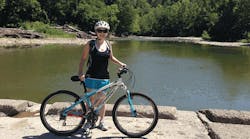All winter I waited and prepared for this. The sun is shining, the grass is green and the trees are budding. It is cycling season.
Finally, I can haul my bike out of the basement and get outdoors, free at last to explore the city on two wheels instead of being confined to the very stationary bike in the cardio room at the rec center.
Moving my cycling efforts from indoors to outdoors is more than just a change of scenery though; it's a transition from one world to another.
When I'm on the upright bike at the rec center, surrounded by ellipticals and treadmills, I am exercising. But, riding my bike through the streets of my city is an adventure.
I don't depart on this adventure without preparation though. Before I go anywhere, I pull my hair into a ponytail and fasten my helmet under my chin. Like clockwork, every time.
That simple act of putting on a helmet signifies to my brain that I am now bike riding because I don't wear a helmet for any other activities in my daily life.
(I don't think the impact comes from wearing protective equipment, however. Rather I think it comes from the act of wearing specialized equipment, something designed for that task.)
I have a similar yet different reaction when I put on ice skates at an ice rink. Lacing up my skates before hitting the ice, I enter my seldom-used ice skating mindset.
While cycling, which is something I do a few times a week, I am focused on the adventure and which route I should take because I've already developed the skills – fundamental and safety – needed to ride a bike. But when at an ice rink, I consciously think about the actions needed to skate properly; the muscle memory isn't developed enough to let my mind roam.
Where the two activities diverge highlights what I see as a safety conundrum: developing skills to perform a task safely, while not becoming so comfortable performing that task that you're not consciously thinking about how to do it safely.
When a worker enters the factory, a place he's worked for 10 years and where he's had countless hours of training on performing his job safely, how do you keep him cognizant of safety?
He performs the same general set of tasks every day, is a master at his trade, yet he needs to somehow not fall into a comfort zone.
Last year, riding my regular route around a nearby lake, I decided to veer off the road and up a hill to a bike path so that I could get a better view of the water. I did so without assessing my surroundings and ended up overturning my bike on a giant tree root. Thankfully, I only ended up with a broken helmet, a dirt-covered face and a few scratches. Oh, and a bruised ego.
I never would have attempted something like that while ice skating. Honestly, I'm not even sure I would know how to take a risk while skating. How exactly does one execute a triple Lutz jump? But, on my blue and orange bicycle, I am in control of my universe (or so I think) and I don't always even recognize risk.
Likewise, in the workplace, we need to make sure that when we put on our hard hats or work gloves, or move into position at a CNC machine that we're also consciously putting on our safety hats.
